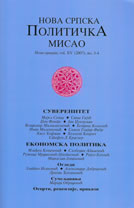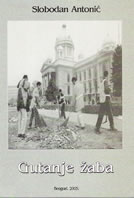| NSPM in English | |||
Kosovo is American |
 |
 |
 |
| четвртак, 02. септембар 2010. | |
|
(Strategic Culture Foundation, 24.8.2010)
What about statehood? On the 22nd of July 2010, 10 out of 14 judges of the International Court of Justice (ICJ) in The Hague approved the Kosovarian declaration of independence as compatible with the standards of international law. Independence had been declared on the 17th of February 2008 by an “Assembly of Kosovo” in the parliament in Prishtina. The statement of the ICJ is restricted to the proclamation of the independence and does not refer to the legality of secession. This is a minor contradiction. A more serious contradiction lies in the fact that the Kosovarian assembly in the parliament at the time formally was (and is till today) not representing Kosovo in international belongings. The UN-Resolution 1244 of 1999 put in a “Special Representative of the Secretary General“ as the official representative of the province, which is defined as an integral part of Yugoslavia respectively Serbia. To put it strictly: The Kosovarian parliament was not entitled to represent Kosovo on the international arena. According to international law, no legal body had asked for independence. In the Press release of the ICJ one can read about legality of the „Assembly of Kosovo“ which declared independence: “On this point, the Court arrives at the conclusion that the authors of the declaration of independence . . . did not act as one of the Provisional Institutions of Self-Government within the Constitutional Framework, but rather as persons who acted together in their capacity as representatives of the people of Kosovo outside the framework of the interim administration (..) The authors of the declaration of independence were not bound by the framework of powers and responsibilities established to govern (...)“. Therefore the ICJ “finds that the declaration of independence did not violate the Constitutional Framework”. In other words: because the body which declared independence did not consist of legal representatives of Kosovo, rules of international law were not broken. This is a major contradiction. The ICJ with its verdict de facto followed the position of the USA and the majority of the EU-states. The Western alliance had already tried before the declaration of independence to implement a so-called “independence under surveillance” by the United Nations. The Ahtisaari Plan was wrecked by Russia (and South Africa). So Washington, Paris, London and Berlin implemented this plan without UN-mandate. De jure, UN-resolution 1244 is still valid. Kosovo thereby is a part of Serbia and the UN-administration officially rules status-neutrally. The appeal to the ICJ put the question of state independence on an international level. And it was Serbia asking for it. So Belgrade cannot simply ignore the verdict of the ICJ. To repeat the slogan “Kosovo is Serbian” will not help to overcome its defensive position. Not to speak of the Serbian refusal to take into account the Kosovarian reality. 90% of the population is not willing to accept Serbian national markings. This fact cannot be ignored. Precedent case As a precedent the ICJ-verdict on the declaration of Kosovarian independence is far reaching. First of all it underlines the shift from international law towards a human rights preponderating conflict management. In the last two decades Western conflict management more and more operates with human rights arguments instead of international law. The whole NATO-war on Yugoslavia, which broke international law when it started in March 1999, followed the human rights argument to rescue the Albanian population assuming a Serbian aggression. The code of the law of nations thereby was put aside, outruled. NATO war on Yugoslavia also put an end to the juridical framework of e.g. CSCE guaranteeing national sovereignty, territorial integrity and respecting national borders. Since then, instead of codified international law, human rights served as arguments for military aggressions and interventions (e.g. also in Afghanistan). The range of possible interpretations of human rights makes it easy to use them as manipulative arguments serving as instruments for one’s interest. The acceptance of Kosovo’s independence against the will of Belgrade also is a precedent for many concrete cases. On the territories of Ex-Yugoslavia foremost. After the verdict of the ICJ, it will be harder to explain, why “Republika Srpska” should stay within the federation of Bosnia-Herzegovina and why it should be impossible to split and unite with Serbia. Equally it will not be easy to explain to the Albanian minority in Makedonia, why it should be against international law to declare independence from Skopje or unite with Albania and/or Kosovo. Not to speak of the Serbs in the north of Kosovo who do not accept Prishinta’s authority. Why should they stay in a common state with Albanians? Their possible independence and/or unification with Serbia would follow the same ICJ’s logic. ICJ’s declaration deepens the argument of national independence far beyond Ex-Yugoslavia. As a precedent it is important e.g. also for Tiraspol. The Pridnestrovian Moldavian Republic (PMR) since 20 years asks for independence from Moldova and for international recognition. Only hours after the ICJ-verdict on Kosovo the PMR-authorities underlined their point of view. And in the Georgian periphery the precedent case of Kosovo already led to a reaction from the Russian side when Moscow recognised the declarations of independence of Abchasia and of South-Ossetia in August 2008. Self-determination versus colonial governance Kosovo’s declaration of independence, its recognition by – at the moment – 69 states (out of 192) and the ICJ-verdict cannot hide that Kosovo in reality is not independent at all. This was not intended by the USA anyhow. Self-determination is far out of reach. In military respect this is most evident. After Russian troops withdrew in June 1999 and later in 2003, the US-led NATO settled down in every corner of the country. In Camp Bondsteel, named after an US-officer who was killed in Vietnam, the US-army installed its biggest military camp in Europe covering a territory of almost 4 square kilometres. But also the civil administration is not in the hands of the local government or parliament. The Ahtisaari Plan of March 2007 is the blueprint of the Kosovarian constitution. This constitution clearly notes the colonial status in article 143: “All authorities in the Republic of Kosovo shall abide by all of the Republic of Kosovo’s obligations under the Comprehensive Proposal for the Kosovo Status Settlement dated 26 March 2007 (which is the Ahtisaari-Plan; HH). (...) . The provisions of the Comprehensive Proposal for the Kosovo Status Settlement dated 26 March 2007 shall take precedence (priority, HH) over all other legal provisions in Kosovo. (...) If there are inconsistencies between the provisions of this Constitution, laws or other legal acts of the Republic of Kosovo and the provisions of the said Settlement, the latter shall prevail.” “Independence under surveillance” was (and is) the key word of Western politics planned for Kosovo. The profiteers of this “independence under surveillance”, besides the organised criminals knowing to handle businesses between legal and illegal structures, are tens of thousands of colonisers. Under abbreviations like UNMIK, EULEX and thousands of NGO’s they fill their bank accounts with monthly wages 10 to 20 times higher than an average local employee. Kosovo is a huge field for experiments: military, political, juridical, administrative. Respecting the fact that executive and legislative power are not divided under the administration of UNMIK’s “Special Representative of the Secretary General” (SRSG) and EULEX’s “International Civilian Representative” (ICR), this shows how politics can be made without Western political proceedings. The SRSG- and the ICR-administrations stand above local laws and international standards. Since Russia could not stop the implementation of the Ahtisaari Plan, there seems to be no alternative to the colonial status of the region. Belgrade’s proposal from 2007 to combine territorial integrity and substantial autonomy for Kosovo doesn’t even find enough support in Serbia any more. The most reasonable solution would be to divide Kosovo along the river Ibar. The Serbian population north of it would become what they de facto are: Serbian citizens. South of Ibar a second Albanian state has become reality since 1999. Parallel to this split an anti-colonial move could lead to self-determination within Albanian Kosovo. Several obstacles stand against this vision: the government in Prishtina, which acts as an extended body of Washington and lately threatened with a military intervention in case of Serbs in the north would declare independence from Prishtina; the government in Belgrade, which follows Brussels’ guidelines; and the geopolitical and economic interests of the United States and the European Union. Vague promises from the side of Brussels to integrate Kosovo into the framework of the European Union are not to be taken seriously. Already today Brussels has all economic means in its hands and controls currency and privatisation process. A closer integration would confront Brussels with US-interests. So the status quo is practical for both sides, although it is realised by playing off Serbs and Albanians against each other. Hannes Hofbauer (Austria)
|
Остали чланци у рубрици
- Playing With Fire in Ukraine
- Kosovo as a res extra commercium and the alchemy of colonization
- The Balkans XX years after NATO aggression: the case of the Republic of Srpska – past, present and future
- Из архиве - Remarks Before the Foreign Affairs Committee of the European Parliament
- Dysfunction in the Balkans - Can the Post-Yugoslav Settlement Survive?
- Serbia’s latest would-be savior is a modernizer, a strongman - or both
- Why the Ukraine Crisis Is the West’s Fault
- The Ghosts of World War I Circle over Ukraine
- Nato's action plan in Ukraine is right out of Dr Strangelove
- Why Yanukovych Said No to Europe

.jpg)








 “Kosovo is Serbian”, is one of the key slogans in every political statement throughout Belgrade and Serbian Diaspora-meetings all-around the world. Orthodox monasteries all over the country seem to prove this point of view. “Kosovo is Albanian territory”, is the answer of the majority of the 1,9 million people living on this territory. Their proof seems to be based on the simple quantity of ethnic majority, which – by the way – does not necessarily have to do with statehood.
“Kosovo is Serbian”, is one of the key slogans in every political statement throughout Belgrade and Serbian Diaspora-meetings all-around the world. Orthodox monasteries all over the country seem to prove this point of view. “Kosovo is Albanian territory”, is the answer of the majority of the 1,9 million people living on this territory. Their proof seems to be based on the simple quantity of ethnic majority, which – by the way – does not necessarily have to do with statehood. 










